May 11, 2023
![]() 7 mins Read
7 mins Read
Travelling with: Megan Arkinstall
Money-can’t-buy experiences can, in fact, be bought, thanks to Cultural Attractions of Australia. This collective of the country’s most iconic galleries, sporting grounds and performing arts venues has tailor-made experiences that everyday folk wouldn’t otherwise have access to.
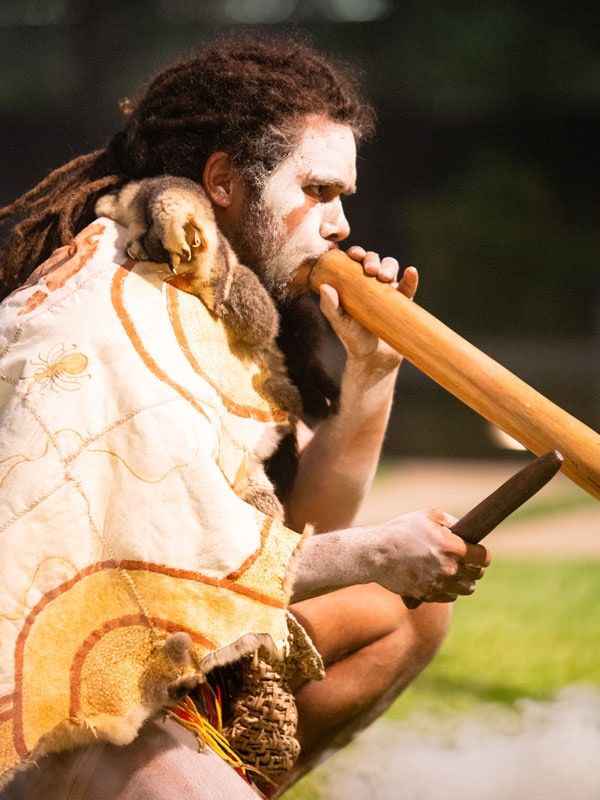
Witness the cultural performance of Derek Oram Sandy at QAGOMA. (Image: Lewis James Media)
Imagine viewing masterpieces in Canberra’s National Gallery of Australia when the doors are locked to the general public. Or spending an exclusive evening immersed in Indigenous art and dining at Brisbane’s QAGOMA. What about gaining behind-the-scenes access to the players’ rooms and inside the century-old scoreboard at Adelaide Oval?
It’s also worth splashing some cash on a private dinner under the 24-metre blue whale skeleton at WA Museum Boola Bardip in Perth.
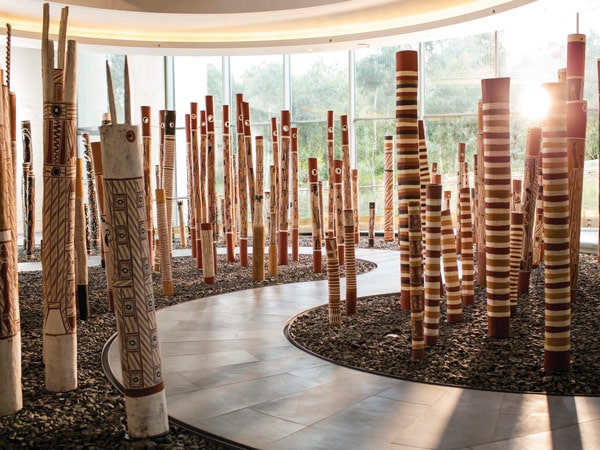
Ramingining artists, The Aboriginal Memorial, 1987-88, National Gallery of Australia, Canberra, purchased with the assistance of funds from National Gallery admission charges and commissions in 1987. (Image: Tourism and Events Queensland)
Travelling with: Carla Grossetti
You know the graffiti movement has gone global when it cements itself in the regional NSW town of Griffith. Head to Banna Lane in its backstreets to find a wall of works that includes a striking rendition of painted honeyeaters signed by artist Thomas Jackson.
The UK-born Australian artist draws inspiration from nature to paint large-scale murals of wildlife listed as vulnerable species.
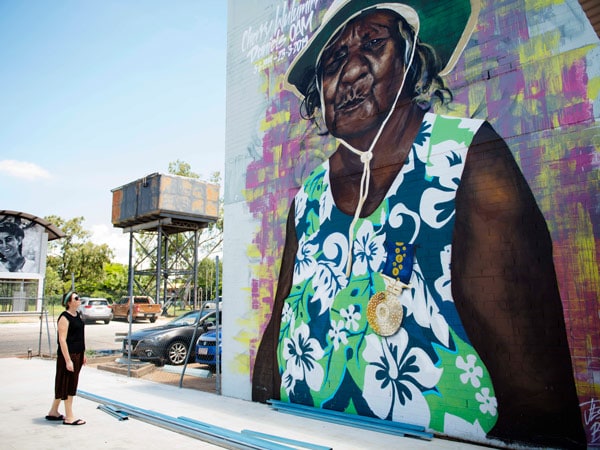
Explore Katherine Street Art. (Image: Tourism NT/Elise Derwin)
There is a long-held tradition of street artists acting as social commentators to present their interpretation of the world and what they see as important. And there are great examples of street art providing more context to the built environment everywhere from Newcastle to Dubbo, Kiama, Perth, Shepparton and Katherine.
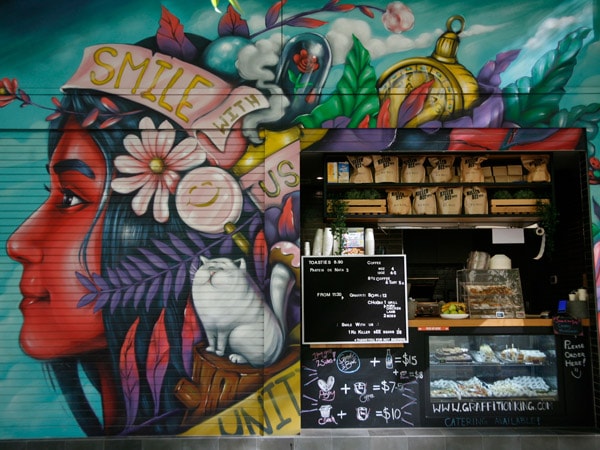
The Banna Lane Festival has brightened up Griffith. (Image: Caitlin Withers)
Progressive councils across the country have recognised that life looks different when viewed through the eyes of a street artist and are now inviting them into public spaces to tell stories about their cultural identity. Our urban environments are all the better for it.
These intense layerings of paint on plaster or brick add more than splashes of colour to the edges of society’s broader fabric. It’s an expansive, albeit ephemeral, archive of people and community.
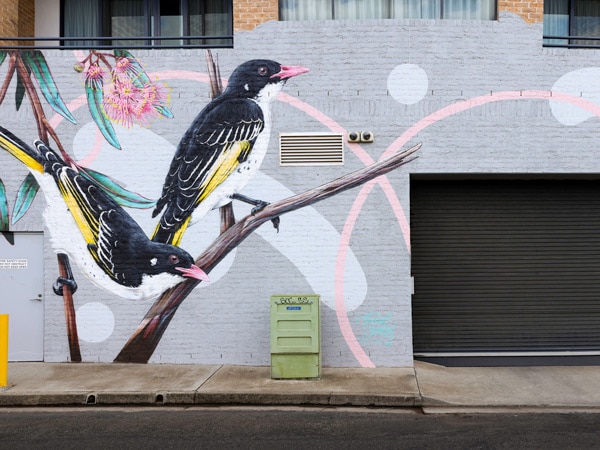
The Perth street art scene even has its own Instagram handle: @perthstart. (Image: Caitlin Withers)
Travelling with: Elizabeth Whitehead
An estimated 1.3 billion people around the globe living with a disability, accessible tourism is a fast-growing area. Sydney was recently ranked by the Valuable 500 – a business collective striving for disability inclusion – as one of the top 10 most accessible cities in the world. While features such as public transport, wheelchair accessibility at attractions and the 2100-plus Braille street signs across the city were highly rated, there’s still plenty of room for improvement – in Sydney and beyond.
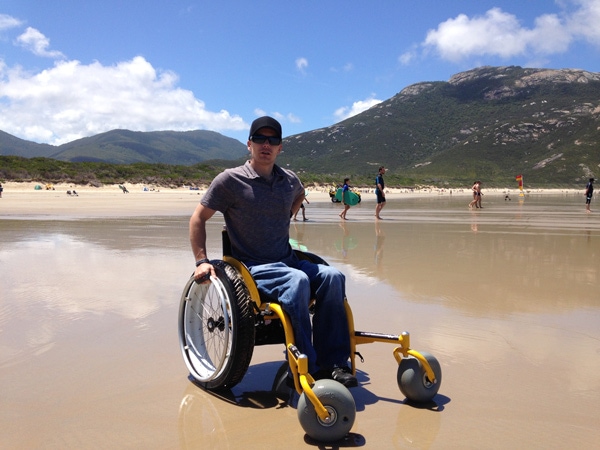
Sustainable travel must also cater to differently-abled people. (Image: Parks Victoria)
Luckily, technology is changing the face of travel by providing tools that allow people with disabilities to better navigate the world. One example is Vacayit, an app that uses compelling, high-quality audio stories to help blind and low-vision visitors connect to place with more than 120 guides around Australia. The app is compatible with assistive technology such as screen readers, transcripts and voice search to be more accommodating to users.
The tourism industry is also becoming more mindful of the diverse needs of visitors. The result is a more inclusive range of offerings, such as the beach wheelchairs available in Victoria’s coastal national parks, and thoughtful touches such as free sensory backpacks at WA Museum Boola Bardip in Perth to help accommodate children prone to overstimulation. Ultimately, inclusive travel recognises that we are all unique and that the joys of travel should be accessible to all.
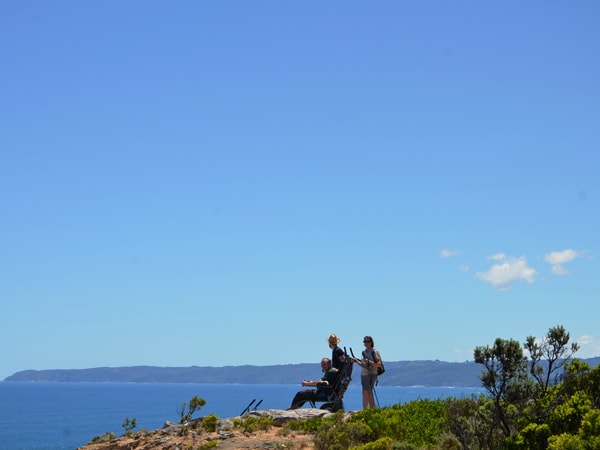
See the beauty of the world from a different perspective. (Image: Parks Victoria)
Travelling with: Kassia Byrnes
There’s a new way to see Australia arriving in 2025 and it comes with comfort, luxury and nautical miles. Viking has announced a Grand Australia Circumnavigation cruise, which will make its way around our stunning coastline and beyond over 32 days.
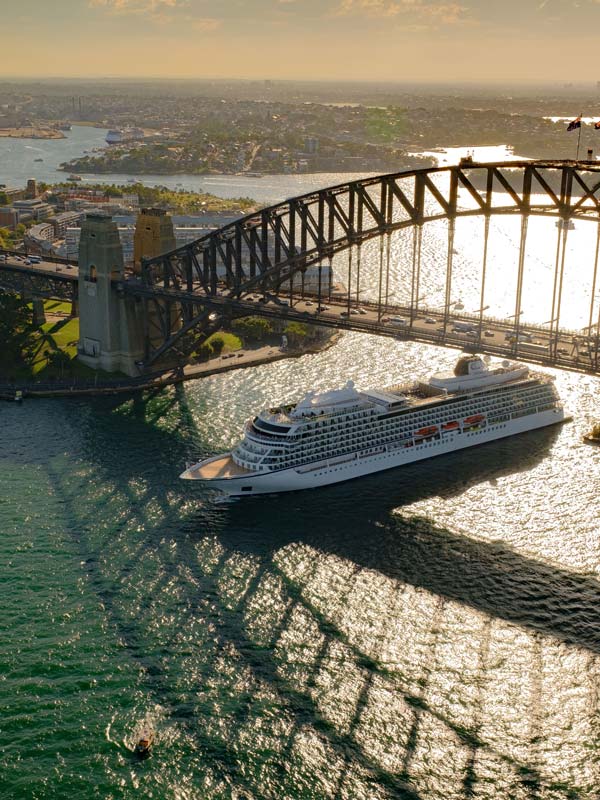
The Grand Circumnavigation Cruise arrives in 2025. (Image: Viking Cruises)
Wave goodbye to Sydney Harbour before sailing up the coast to Cairns with stops in the Whitsundays and more before hitting the Arafura Sea at the Top End. From here you’ll divert to Indonesia for stops in Komodo and Bali before circling back to where you started via Western Australia, South Australia, Victoria and Tasmania. Phew!
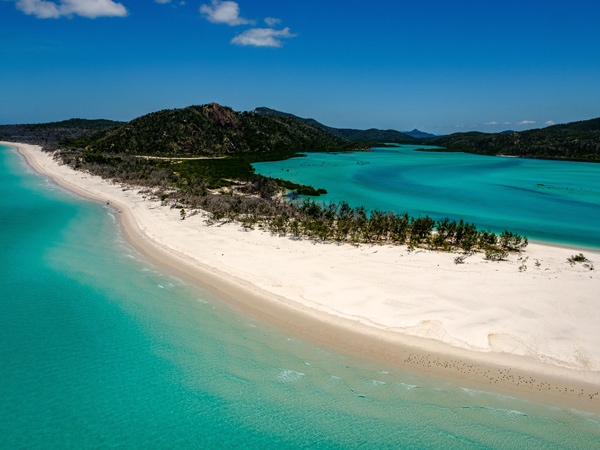
Stop off at breathtaking locations like Hamilton Island. (Image: Viking Cruises)
Travelling with: Emily Murphy
Surrounded by a lush green pine forest, I step out of my car and am greeted with silence as I’ve never heard it. Calm, peaceful, sleepy serenity. I’m physically only two hours south of Sydney, but mentally I’m a world away. We pack our things into wheelbarrows and tread down the steep hill, a few hundred metres into the wild unknown. Enveloped by ferns and leafy canopies, I’m amazed this can be found so close to the city.
The trees open into a clearing, and then we see her. Jojo, our Unyoked cabin. With cabins all over the country, Unyoked was created to help people understand how nature can make us better and allow us to weave it into our lives easily and regularly.
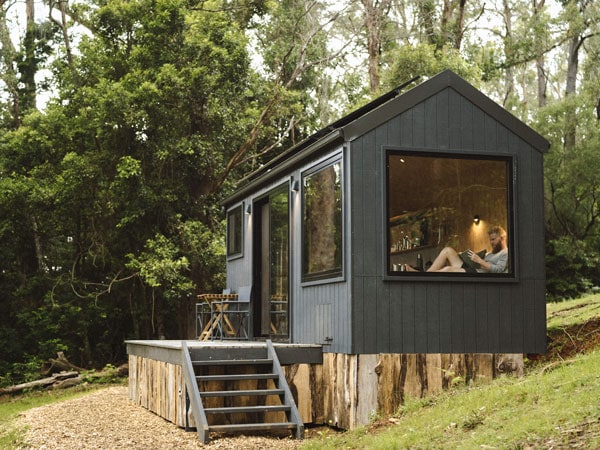
Discover the joy of seclusion in Jojo. (Image: Declan Blackall Photography)
Jojo welcomes us with her charm, comfort and all-encompassing luxury. The plush KOALA queen-size bed sits surrounded by two giant windows overlooking the small valley below, the same serene views you’ll soak in from the bathroom’s rainfall shower.
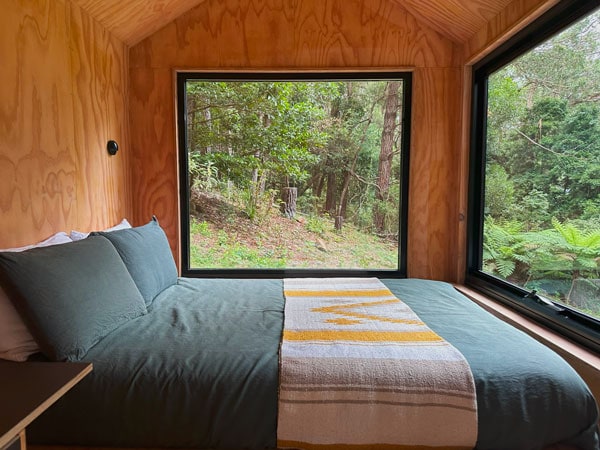
Snuggle up and admire stunning scenic views in Jojo. (Image: Emily Murphy)
The next two days are filled with fire-making, games of UNO and Scrabble, kitchen experiments, walks in the forest and a whole lot of lying in bed watching and hearing wildlife float by the windows. I leave feeling more connected to nature than I have in as long as I can remember.
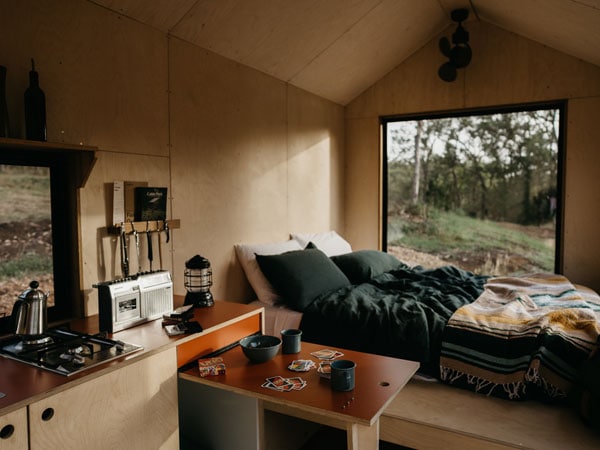
Ashi is another cosy Unyoked cabin in the Northern Rivers of NSW. (Image: Jessie and Trent)
The pure perspective of how big nature is and how small we are in comparison reminded me I need to show more love and give more space to the world around me. Unyoked isn’t the only company going off-grid for nature. The trend is growing, with tiny houses springing up like mushrooms after rain.
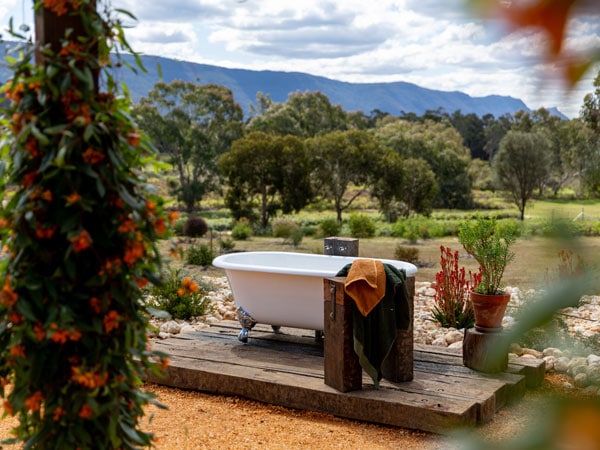
Enjoy an outdoor bath at Nook on the Hill in Grampians/Gariwerd.
For an immersive tiny house in the foothills of Victoria’s Grampians/Gariwerd, Nook on the Hill is built almost entirely from repurposed materials. Complete with a stunning outdoor bath, this tiny house is the perfect cosy escape.
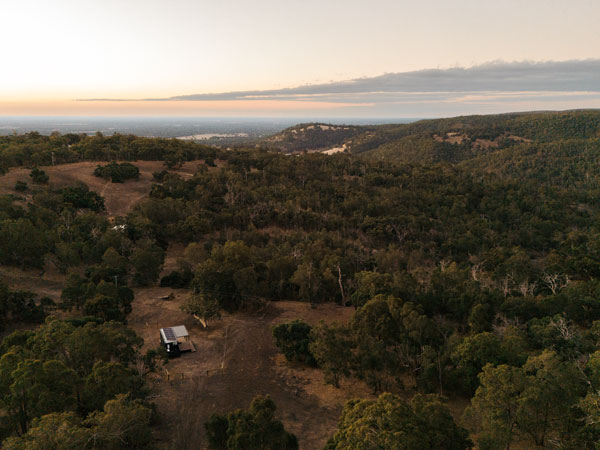
Fiona the Heyscape cabin is the perfect hideaway in the Serpentine. (Image: Martin Callow Photography)
Over in WA, you’ll find Heyscape – tiny cabins for those who love being immersed in nature, but also love a comfortable bed with the blinds drawn. In Queensland’s Lamington National Park, part of The Gondwana Rainforests of Australia, Binna Burra Lodge has just opened its new Tiny Wild Houses.
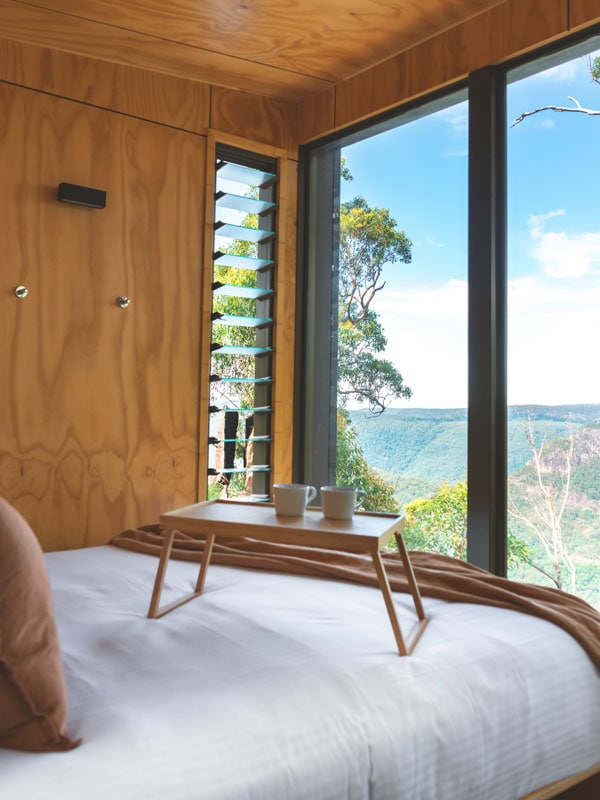
Bunker down in Binna Burra’s Tiny Wild Houses.
Part of the historic rainforest lodge’s post-bushfire rebuild, they have an entire glass wall providing stunning vistas of the Ships Stern Range. If you’re looking for capital in Canberra, Cubby and Co offer ‘naked’ stays, encouraging guests to leave technology behind and reconnect with loved ones, nature and the stars.
For the  best travel inspiration delivered straight to your door.
best travel inspiration delivered straight to your door.
LEAVE YOUR COMMENT